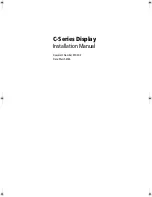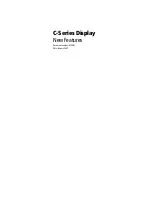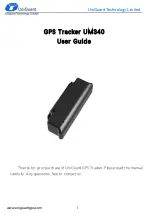
Removing the Device from the Cradle
1
Press the release lever
À
on the cradle until the device is
released.
2
Tilt the device forward, and lift it out of the cradle.
NMEA 2000
®
Considerations
NOTICE
If you have an existing NMEA 2000 network on your boat, it
should already be connected to power. Do not connect the
NMEA 2000 power cable to an existing NMEA 2000 network,
because only one power source should be connected to a
NMEA 2000 network.
If you are installing a NMEA 2000 power cable, you must
connect it to the boat ignition switch or through another in-line
switch. NMEA 2000 devices will drain your battery if the NMEA
2000 power cable is connected to the battery directly.
NMEA 2000 compatible models can connect to a NMEA 2000
network on your boat to share data from NMEA 2000 compatible
devices such as sensors or a VHF radio. The necessary NMEA
2000 cables and connectors are sold separately.
If you are unfamiliar with NMEA 2000, you should read the
“NMEA 2000 Network Fundamentals” chapter of the
Technical
Reference for NMEA 2000 Products
. To download this
document, go to
and select Manuals on the
product page for your device.
The port labeled NMEA 2000 on the back of the device is used
to connect it to a standard NMEA 2000 network.
NOTE:
Models that are not directly NMEA 2000 compatible
require the included 4-pin adapter cable to connect to the NMEA
2000 network.
Item
Description
À
NMEA 2000 compatible Garmin device
Á
NMEA 2000 drop cable
Â
NMEA 2000 power cable
Item
Description
Ã
Ignition or in-line switch
Ä
12 Vdc power source
Å
NMEA 2000 terminator or backbone cable
Æ
NMEA 2000 T-connector
Ç
NMEA 2000 terminator or backbone cable
Wiring Harness
• The wiring harness connects the device to power and NMEA
®
0183 devices.
• The device has one internal NMEA 0183 port that is used to
connect to NMEA 0183 compliant devices.
• If it is necessary to extend the power and ground wires, you
must use 0.82 mm
2
(18 AWG) or larger wire.
• If it is necessary to extend the NMEA 0183 or alarm wires,
you must use .33 mm
2
(22 AWG) wire.
Item
Wire Function
Wire Color
À
NMEA 0183 internal port Rx (in)
Brown
Á
NMEA 0183 internal port Tx (out)
Blue
Â
Ground (power and NMEA 0183)
Black
Ã
Power
Red
Connecting the Wiring Harness to Power
1
Route the wiring harness to the power source and to the
device.
2
Connect the red wire to the positive (+) battery terminal, and
connect the black wire to the negative (-) battery terminal.
NMEA 0183 Connection Considerations
• The installation instructions provided with your NMEA 0183
compatible device should contain the information you need to
identify the transmitting (Tx) and receiving (Rx) A (+) and B
(-) wires. Each port may have one or two transmitting wires,
or one or two receiving wires.
• When connecting NMEA 0183 devices to ports containing
two transmitting (Tx) wires or two receiving (Rx) wires each, it
is not necessary for the NMEA 0183 device to connect to a
common ground.
• When connecting a NMEA 0183 device to ports containing
one transmitting (Tx) wire or one receiving (Rx) wire each,
the NMEA 0183 device must be connected to a common
ground.
• When the device is mounted in a location that prevents the
internal antenna from acquiring a satellite signal, you can
connect an external GPS 19x antenna through a NMEA 0183
connection. For more information, see the
GPS 19x
Installation Instructions
.
NMEA 0183 Connection Diagram
+
-
4
























